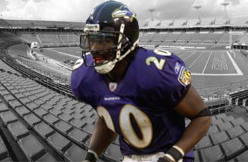Curious to know how Ray Lewis felt about the Ravens 17-15 loss to the Colts on Sunday? Want to know what Ed Reed was thinking on that last-minute lateral?
Me too.
Only problem was, neither player was interested in talking to the media after the game. Lewis kept his back to reporters, facing his locker, while he was getting dressed and then declined to even acknowledge a few questions asked by several media members as he left the locker room. Reed took a similar approach, declining to answer any questions before slipping out the back door.
It's probably important to point out this isn't exactly abnormal behavior from either of them. Reed's silence is at least consistent with his personality, since he'd usually prefer not to answer questions in either victory or defeat. (Although if he ran that punt back for a touchdown, I suspect he'd have talked. Just a hunch.) But Lewis' reluctance to answer questions after losses has become more troubling in recent years. He wouldn't talk after the AFC Championship game loss last year. He wouldn't talk after the Ravens home loss to Cincinnati earlier this year, and quickly got on his cell phone and didn't take questions after the Ravens lost to the Bengals on the road.
To be fair, he did talk after the Ravens losses to the Patriots and Vikings.
I'm somewhat torn as to whether this matters. Whether it's meaningful, or meaningless. So I turn the question over to you, but not before I attempt to see both sides of the issue.
On one hand, I can see why Lewis might feel like it's in his best interests not to speak, especially with emotion and adrenaline still pumping through his veins. Even as a media member, I do understand how difficult it must be to have 30 strangers stick tape recorders, notebooks and television microphones six inches from your face 15 minutes after a gut-wrenching loss. Lewis and Reed weren't fined for their post-game comments about the officiating after a loss to the New England Patriots earlier this year, but they easily could have been. (It was almost surprising that they weren't, considering how much the league abhors criticism of its referees.) If you know you might say something you'll regret, either financially or because it might affect morale, maybe it is in your best interests to walk away and speak later when you're calmer. Maybe Lewis and Reed said all they felt they needed to say right after the game before the locker room doors were open to the media.
On the other hand, someone does have to talk after the game, win or lose. And before you launch into a rant about the media's arrogance, let me say up front that this is not about that. Take the media out of it for a moment, because in this situation, it's not as if Lewis or Reed talked to the NFL Network, or the Ravens' team blogger or website reporter, and blew off everyone else. They didn't want to talk to anyone, period. Don't you, as a fan, want to know Lewis' opinion on why the Ravens can't win close games? Why the season, once so promising, seems on the brink of coming apart? Lewis isn't shy about talking after victories, I'll point out. And in his weekly session with the media, he certainly makes it clear he still feels he's the leader of this team, a distinction he's certainly earned during his Hall of Fame career.
The fact that he's not the same player he was at 25 is irrelevant as long as he's still considered the leader of the team, and is paid, at least in part, handsomely for that leadership. Ozzie Newsome and Steve Bisciotti both cited his leadership as a reason he was re-signed to a deal that probably paid him more than his market value. So shouldn't a leader be there to stand up and take the heat, or at least offer explanations, when things don't go well? Isn't that part of the reason why Lewis makes more than Jarret Johnson at this point in their respective careers? Because if Ray Lewis or Ed Reed doesn't want to talk, someone else is going to get those questions. I think it's a little bit unfair to constantly preach accountability to your teammates, then selectively choose when to apply it in your own life.
Sometimes I think fans hear media grumbling about a player not wanting to talk, and assume the reporter feels he or she is being personally slighted. And maybe that's occasionally true. But I don't think it's the case here. Personally, I don't care if he talks or he doesn't. He silence speaks volumes if I'm trying to write a story.
But if you're a Ravens season ticket holder, or if you spend four hours every Sunday glued to your television, living and dying with the results of every game, you're essentially paying the salaries of these players. Don't let anyone tell you different. Maybe you don't care what the men beneath those purple and black helmets have to say. And maybe you'd enjoy the game just as much if it was played by mute robots.
But I suspect that's not true. I suspect you would like to know, if only for a few seconds, what the team leader thinks about all this.

(baltimoresun.com)


